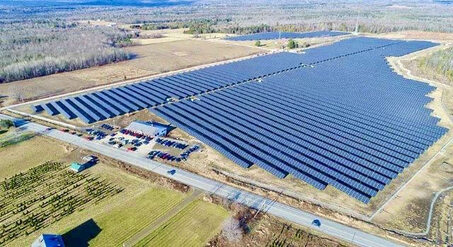-The ZTA has no protections for water quality/habitat/prime soils/forests.
-Despite clims to the contrary, there are no stipulations that this energy would be part of the "community solar" portfolio for use in the County and could be sold to other states.
-Industrial Solar is not an agricultural use. Full stop.
-The county's own Climate Change Working Group has said that putting industrial solar in the Ag Reserve could be counter productive to carbon reduction goals.
After a public hearing in early March, the ZTA was put on hold as a result of the pandemic. The Transportation and Environment Committee (T+E) had their first meeting on the ZTA on July 9. You tube video here. Here is a wrap up.
- Kudos to Councilmembers Jiwando, Glass, Rice and Friedson for their understanding that this issue is controversial. Renewable energy generation is necessary, but there can be disagreements about how and where it is sited to balance other carbon sequestration methods (like reforestation and regenerative ag being undertaken in the Reserve right now).
-The Councilmembers who had not co-sponsored this ZTA also expressed the sheer volume of questions and information they needed to understand the issues at play. Councilmember Friedson at one point said, "I know nothing about the electrical grid." Cheers to our decision makers who are willing to admit what they don't know and find the answers on these complicated issues.
-Councilmember Jiwando rightly spoke to the defensive feeling Ag Reserve stewards have to this type of proposal, a feeling that results from many, many non-ag uses being proposed for what some consider to be "empty" or "open" land. The Reserve is not a place to put what Royce Hanson, architect of the Ag Reserve has called "inconvenient infrastructure". It is, however, a place that could benefit from more small table crop producers to meet local food demand in line with it's agricultural purpose, check out our Land Link program.
-While given very little time to make his case, Jeremy Criss of the Office of Agriculture spoke to the reasons for the unanimous opposition to this ZTA from local farmers. Half of the Reserve's farmers are leasing land and allowing large scale solar arrays would kick many of them off their leased land because of the much higher return landowners can get with solar than crop production. This is not just a commodity problem (corn,soy wheat)- while we seek more landowners to lease small acreage to new and expanding farmers through our Land Link program, an acre of solar panels could easily be chosen over giving a new farmer their start in the only area in the county set aside for agriculture.
-While some issues raised by testimony in the public hearing were taken up in this committee session, precious little time was spent on water quality, protection for forests or habitat. MCA and our supporters strongly oppose this ZTA as industrial solar is not a agricultural use, but at a minimum arrays must be very carefully sited to not cause environmental problems in solving another.
The next Committee Meeting is Thursday the 16th. Please take action today.







